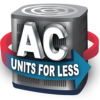At AC Units For Less, we often get a lot of questions about furnaces—what they do, how they work, and whether they’re the right solution for your home heating needs. Whether you're in the market for a new furnace or just looking to learn more about your home's heating system, we've answered some of the most frequently asked questions about furnaces below.
What Does a Furnace Do?
A furnace is the key component of a home heating system. Its primary function is to generate heat and distribute it throughout your home. The furnace heats air through various fuel sources (such as natural gas, electricity, or oil) and then pushes the warmed air into your living spaces through ducts.
What is a Furnace Used For?
Furnaces are used for heating homes or buildings. They are typically part of a central heating system, which keeps indoor environments warm during cold weather by maintaining a consistent temperature throughout the space.
Is the Furnace the Same as HVAC?
Furnaces are not the same as HVAC. HVAC stands for Heating, Ventilation, and Air Conditioning, which is a broader term that encompasses the entire system used to heat and cool your home. A furnace is part of the heating portion of an HVAC system, while the air conditioner is part of the cooling side.
How Much Should I Spend on a Furnace?
The cost of a furnace can vary depending on the size of your home, the type of furnace (gas, electric, or oil), and the efficiency of the system. On average, a new furnace can cost between $2,500 to $7,500 including installation. Higher efficiency furnaces (like those with a higher AFUE rating) may have a higher upfront cost but save you more on energy bills in the long run.
Does a Furnace Use Gas or Electricity?
Furnaces can use different types of energy sources:
- Gas Furnaces: The most common type, these furnaces run on natural gas or propane.
- Electric Furnaces: These furnaces use electricity to generate heat, often ideal for areas where gas lines aren’t available.
- Oil Furnaces: Though less common today, oil furnaces are still used in some homes, especially in rural areas.
Do You Need a Furnace to Heat Your Home?
No, you don't necessarily need a furnace to heat your home. Other heating options include heat pumps, boilers, and space heaters. However, furnaces are a popular choice due to their efficiency and ability to provide consistent, even heating across multiple rooms.
Do Houses Still Use Furnaces?
Yes, many homes still use furnaces, especially in areas with cold winters. Furnaces remain a reliable and cost-effective solution for heating, and many modern furnaces are designed to be highly energy-efficient, making them a popular choice for new installations as well.
What Usually Goes Out on a Furnace?
Common issues with furnaces include:
- Ignition problems: Especially with gas furnaces, the ignitor or pilot light can malfunction.
- Thermostat issues: Faulty thermostats can result in the furnace not turning on or maintaining the correct temperature.
- Blower motor failure: The blower motor, which moves air through the system, can wear out over time.
- Clogged filters: Dirty filters can reduce airflow and cause the furnace to work harder, leading to breakdowns.
Regular maintenance can help prevent these issues.
Does the Furnace Control the Heat?
Yes, the furnace is the primary system responsible for generating and controlling heat in your home. It is usually regulated by a thermostat, which allows you to set the desired temperature. The thermostat signals the furnace to turn on and off based on the temperature inside your home.
How Often Do You Need a Furnace?
Furnaces are typically built to last between 15 to 20 years, depending on the type and how well it's maintained. Regular maintenance, such as changing filters and having annual inspections, can extend the life of a furnace and keep it running efficiently.
For more information or help choosing the right furnace for your home, visit AC Units For Less at acunitsforless.com. We offer a range of high-quality furnaces and HVAC systems to fit your heating needs.



